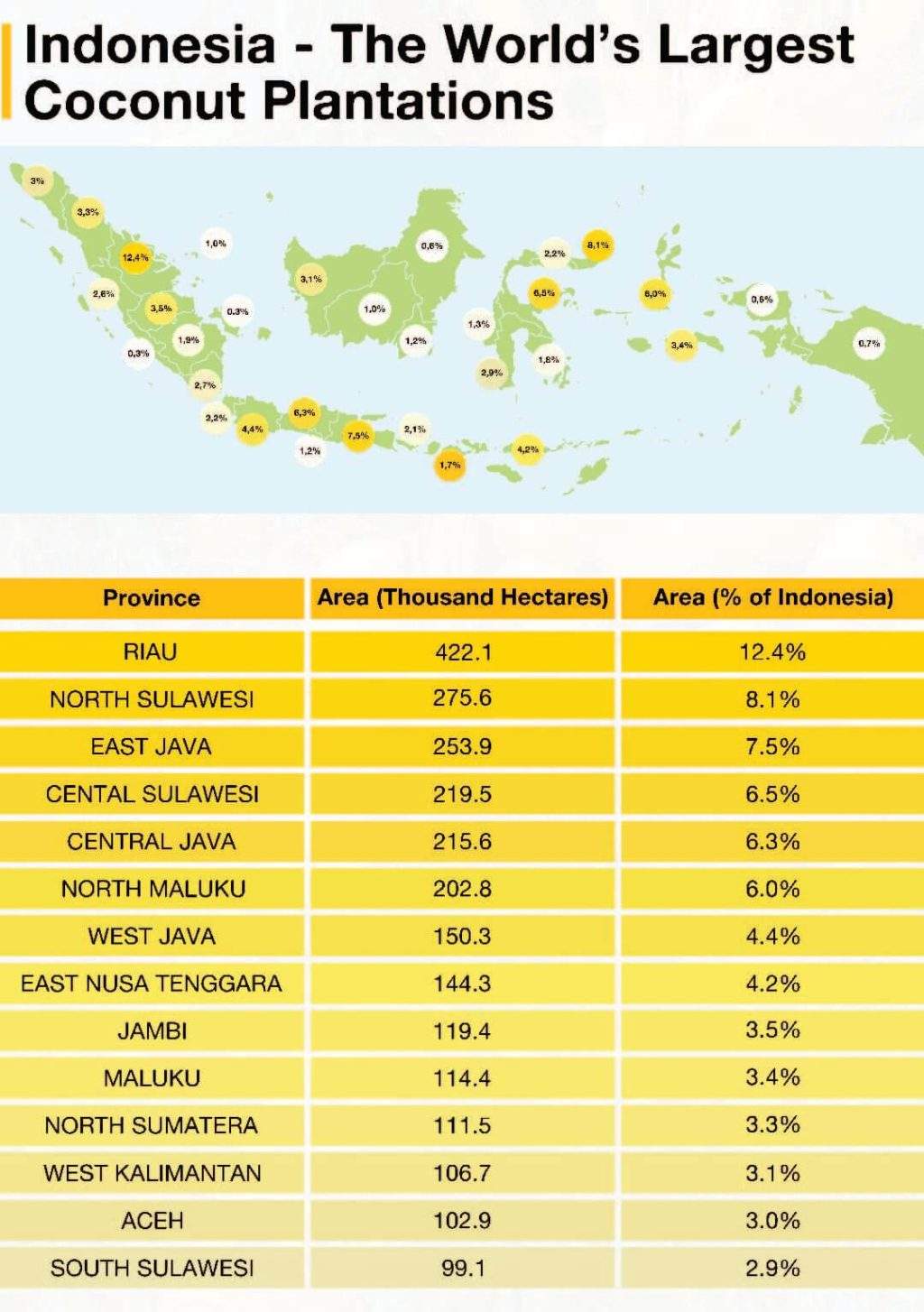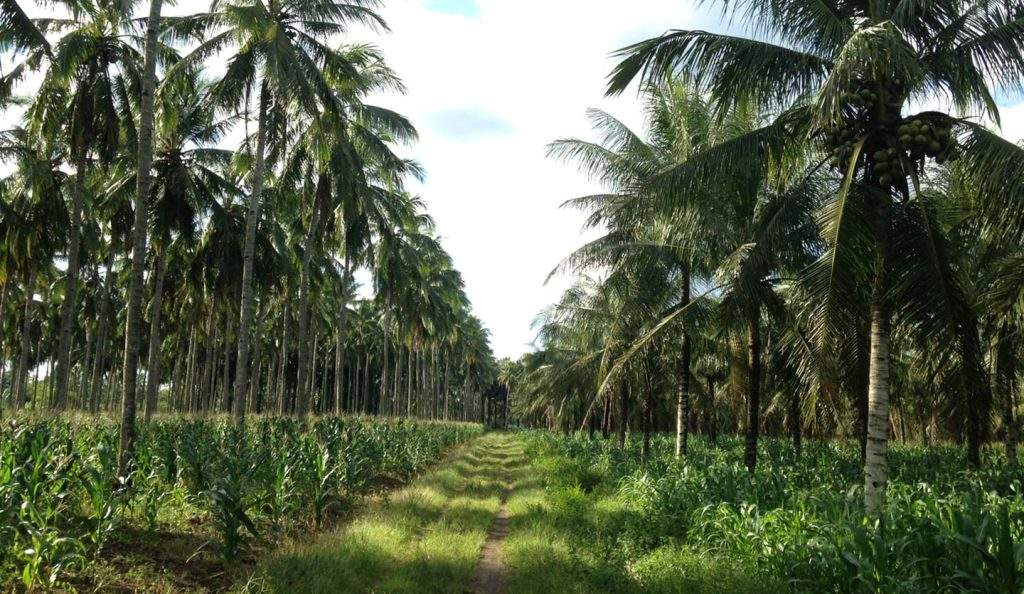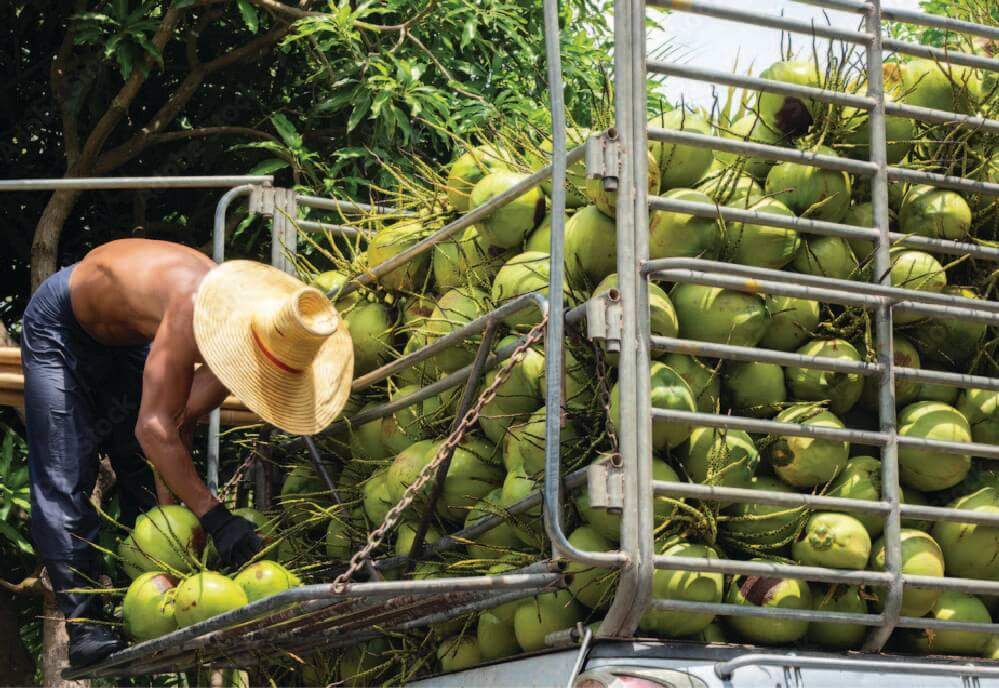Why Indonesian Coconuts? Did you know that Indonesia is the world’s largest producer of coconuts? It’s a fact! With a total of 3.7 million hectare plantations across the archipelago, Indonesia produced 17 million metric tonnes of coconuts in 2020. And these coconuts aren’t just enjoyed locally; they also play an essential role in meeting one-third of the world’s growing demand for coconut-based products.
The quantity of coconut products from Indonesia keeps growing every year. In 2021, the export growth rate of coconut products from Indonesia increased by an astounding 12%. The phenomenal growth observed in recent years proves that not only are Indonesian coconuts participating in the global coconut industry but also are prominent players. Because of their superior quality and quantity, Indonesian coconuts are in high demand all over the world.
But what distinguishes Indonesian coconuts from others? Indonesian coconuts are simply ranked as the world’s best coconuts in the market. With vastly rich argillaceous soil, equatorial climate, well-distributed rainfall, wide coastal areas and perfect land heights, Indonesia truly has what it takes to naturally grow coconut trees with high yields and superior quality nationwide. The abundant supply of coconut raw materials, strategic locations and continuously developed infrastructures have enabled Indonesia to provide not only high-quality coconut products but also competitive prices at scale. No wonder, Indonesia’s coconut products have become one of the most highly sought-after commodities in the world for decades.

Coconuts: “The Tree of Life”
Coconut trees are also known as the “tree of life” because firstly every part of this plant can be virtually put to good use with high added values and enormous benefits to its end users. Every part of this tree is useful, from the healthy fruit to the strong stems and leaves. Coconuts have been a source of food, water, and important building materials for people living in tropical countries for hundreds of years including Indonesian coconuts.
Second, coconuts have a profound cultural and spiritual importance in many societies that are found in tropical regions including Indonesia. They frequently play a symbolic role in rituals, celebrations, and other traditions, and are thought to represent life, abundance, and fertility. Coconuts play an important role in many religious and cultural rituals, including the giving of offerings and receiving blessings. The intrinsic worth and importance of coconuts in the lives of people in these places is highlighted by the deeply ingrained cultural tie that exists between them.
Third, coconuts including Indonesian coconuts can grow in some of the harshest environments, like saltwater, tropical storms, and droughts. Their ability to survive and thrive in harsh environments symbolizes how strong and resilient this living species is. Therefore, the coconut tree is a great example of nature’s ability to provide food and shelter, which is why it is known as the “tree of life.
Let’s explore its potential uses.
A coconut tree bears a coconut fruit which is used for nutrition, fuel and shelter. From the fruit comes a delicious white meat that is commonly added to recipes or made into coconut oil, coconut milk, coconut cream and copra. The unsweetened fresh meat can also be finely shredded and dried to produce desiccated coconut, which is deliciously eaten by itself as a snack or as a wonderful addition to baked goods and confectionery. Indonesian coconuts tend to have sweeter and creamier meat, setting them apart from coconuts from other countries.
Coconut fruits also contain coconut water, a refreshing liquid packed with electrolytes and a sweet nutty flavor with a ton of health benefits. It is often consumed by professional athletes as a healthy sports drink, earning it the title of “nature’s sports drink” for decades. Indonesian coconuts are known to produce sweeter and more refreshing water, making them an excellent choice for fresh bottled coconut water.
Meanwhile, the sap from coconut blossoms is made into beverages, syrup, candy and coconut sugar – a healthy sugar alternative with a lower glycemic index than regular table sugar. Indonesian coconuts produce a unique taste profile when heated and turned into coconut sugar using a traditional method that helps preserve the sugar’s rich flavor and nutritional content. It has a deep, caramel-like flavor with subtle hints of toffee and butterscotch and adds a distinctive sweetness to dishes and beverages.
Coconut husk and shells are used for handicrafts and various eco-friendly products in many households. The husk can be made into coconut fibers which are perfect for floor mats, brushes, mattresses and ropes; and cocopeat – an ideal growing medium in horticulture and agriculture. Coconut fiber derived from Indonesian coconuts is typically strong, durable, and resistant to environmental factors such as moisture, decay, and pests. These characteristics make it suitable for various industrial applications.
The coconut shells are turned into soup bowls, utensils and ladles just to name a few. They are also burned together as fuel or to produce charcoal for shisha or barbeque. Coconut-based charcoal is considered the healthiest, most eco-friendly form of charcoal to date. Due to its renewable properties and environmentally friendly manufacturing process, coconut shell charcoal is increasingly utilized to further produce activated carbon for air and water purification as well as coconut charcoal briquettes for shisha/hookah and barbeque.
In fact, more than 80% of shisha charcoal used worldwide comes from Indonesia. The fact that charcoal made of Indonesian coconuts is so popular in the shisha market shows how well it works for shisha and hookah applications and is enjoyed by many shisha enthusiasts. Indonesia coconut charcoal for shisha provides a clean, consistent and flavorful smoking experience for its users. It is known to have low ash, consistent burn at a steady temperature and a neutral flavor, which does not interfere with the taste of the shisha tobacco, allowing the natural flavors to shine through.
The leaves and trunks of coconut trees are also equally valuable commodities. They are made into household items and furniture and are used for building houses and patching roofs. Leaves of Indonesian coconuts are known for their strength and durability. They can be woven into durable mats and baskets and used to make sturdy furniture and roofing thatch. The leaves’ natural strength makes them suitable for these applications.
Leaves from Indonesian coconuts are also known as an excellent muscular pain reliever simply by boiling or brewing the leaves. Even the roots of this plant have their own unique uses. The roots of coconut trees can be used to treat heartburn, fever, urinary infections and skin diseases just by boiling and adding salt. While such traditional remedies may be passed down through generations and culturally valued, their effectiveness is not yet scientifically proven.
The list of coconut benefits goes on and on proving that it deserves the title, the plant of life.


Tapping into the Growing Market for Coconut Products with Indonesian Coconuts
The international demand for coconut goods is expanding rapidly, making the sector a desirable investment opportunity. With a compound annual growth of 13.6% between 2018 and 2026, the market is expected to more than double from its 2018 valuation of $11.5 billion to an anticipated $31.1 billion. Demand for coconut-based products made of Indonesian coconuts like coconut oil, coconut milk/cream, coconut water and coconut charcoal for shisha and BBQ has increased as people are seeking healthier and more natural ways to supplement their diets and overall lifestyle. Another factor contributing to this growth is the widespread use of coconut products in the beauty, health, and energy sectors.
In response to the world’s ever-growing demands for coconut products, Indonesia has consistently proven itself to play a prominent role in fulfilling a large percentage of these needs. According to the data reported by the Indonesian Ministry of Trade, coconut oil, coconut meat, shisha charcoal and desiccated coconut constitute the top coconut products exported from Indonesia within the last five years. Collectively, these products account for approximately 30% of the world’s export value in the coconut industry. Products derived from Indonesian coconuts have truly earned a remarkable reputation for their quality and versatility, making them sought after by international markets.
Grand Royal Coco is deeply committed to promoting the high quality of Indonesian coconut exports worldwide. Our mission is to satisfy the rising global demand for high-quality coconut-based products while also making use of Indonesia’s vast coconut resources. We offer a large selection of high-quality coconut goods that have been ethically obtained and processed to conform to global norms. Our commitment to reliability, quality, and competitive pricing makes us a preferred partner for businesses seeking a consistent supply of top-tier Indonesian coconut products.
We invite you to explore our extensive selection of coconut offerings and discover how Grand Royal Coco can be your trusted partner in meeting the demands of your business. Together, we can harness the potential of Indonesian coconut products to serve a world that increasingly values health, sustainability, and the exquisite flavors and qualities of this remarkable “plant of life.”
Click here to view a full list of our coconut products and find out how we can help provide reliable long-term supplies for your business.

